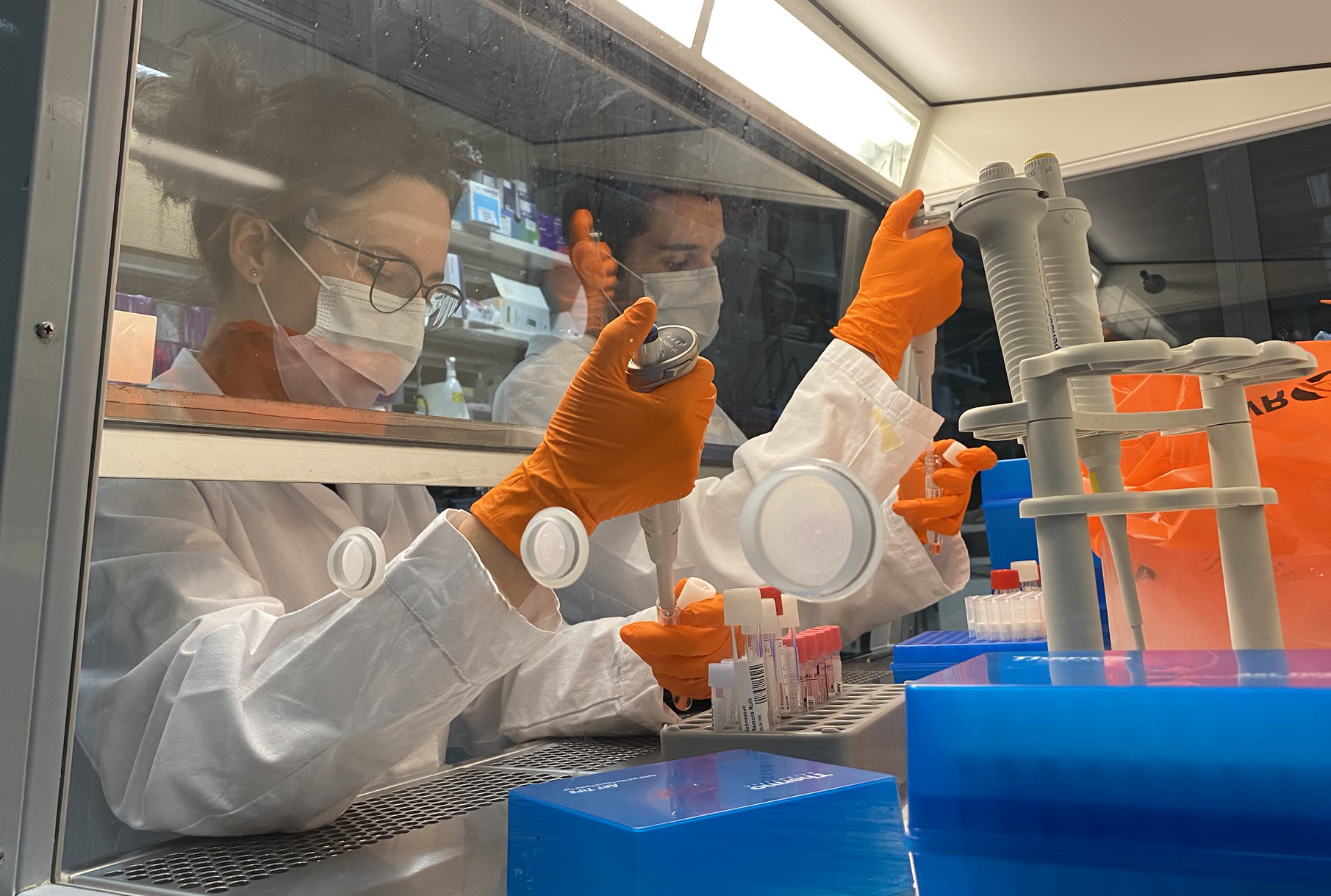Covid-19 Diagnostics and Research Response

The SARS-CoV-2 pandemic situation is unprecedented in living memory. Since early 2020, our diagnostic and research groups have had to repurpose their usual activities and provide a co-ordinated response to this crisis. Below is a summary of the activities we have undertaken:
Diagnostic test development: virus detection
Alexandra Trkola, Michael Huber
Our diagnostics unit established and massively expanded SARS-CoV-2 PCR testing from January 2020 onwards. Due to our early activities, we served as a reference center for authorities and other diagnostic laboratories. We were also engaged in validating commercial tests comprising RT-PCR, LAMP and antigen tests. To expand capacities for mass testing and in children, we established and validated SARS-CoV-2 RT-PCR testing protocols using saliva (Huber et al, Microorganisms, 2021). Based on our studies, saliva was recognized as a valid test specimen by the FOPH (Swiss Federal Office of Public Health). We have also assessed the virome in clinical Covid-19 cases (Keller et al, Stroke, 2020). This work has received funding from the FOPH and the University of Zurich Foundation to Alexandra Trkola. Roche Diagnostics supported us with PCR kits and consumables.
Diagnostic test development: SARS-CoV-2 serology
Alexandra Trkola, Irene Abela
We rapidly established an in-house serology test for the detection of SARS-CoV-2 specific antibody responses. This test, termed ABCORA, measures IgG, IgA and IgM reactivity to four SARS-CoV-2 antigens, and allows sensitive and accurate definition of seroconversion (Abela, Pasin, Schwarzmüller et al, Nat Commun, 2021). The ABCORA test has been used in diagnostics since spring 2020. The development of the ABCORA test was supported by funding from the University of Zurich Foundation to Alexandra Trkola.
Virus sequencing
Alexandra Trkola, Michael Huber
In February 2020, we rapidly generated the first full SARS-CoV-2 genome sequence from the first SARS-CoV-2 positive case in Switzerland. Since then, we have regularly contributed full SARS-CoV-2 genome sequences from Swiss samples to the Nextstrain platform, thereby assisting global surveillance efforts. Our sequencing data also contributes to the monitoring and tracking of SARS-CoV-2 variants in Switzerland (Goncalves Cabecinhas et al, Microorganisms, 2021) and in Europe (Alm et al, Euro Surveill, 2020).
Immunity to SARS-CoV-2
Alexandra Trkola, Irene Abela, Roger Kouyos, Huldrych Günthard
We have expanded our ABCORA test to also record reactivity to four other circulating human coronaviruses. With this assay we are studying the contribution of pre-existing human coronavirus immunity, prior SARS-CoV-2 infection, or SARS-CoV-2 vaccination responses to shaping SARS-CoV-2 infections or re-infections in healthy individuals or those who are immunocompromised with HIV within the Swiss HIV Cohort Study (www.shcs.ch) and the Zurich Primary HIV Infection Study. In the framework of the Swiss-wide COVERALL study, we are also investigating antibody responses to SARS-CoV-2 vaccines in post-transplant and HIV-infected individuals. This work has received funding from the University of Zurich Foundation to Alexandra Trkola, the SNF Special Call on Coronaviruses (grants 196906 and 196245), the Swiss HIV Cohort Study and the Gilead Covid-19 RFP Research Program COMMIT (grant IN-SW-983-6078).
Epidemiological studies
Alexandra Trkola, Irene Abela, Michael Huber
We contribute to the Ciao Corona study that aims to define the prevalence of SARS-CoV-2 infection in children and their contribution to virus spread in the community. Ciao Corona is part of the Swiss-wide research program Corona Immunitas of the Swiss School of Public Health (SSPH+). The antibody analyses in this project are based on our ABCORA test and are conducted at the IMV (Ulyte et al, Int J Public Health, 2020; Ulyte et al, BMJ, 2021). We have also contributed to several studies of SARS-CoV-2 spread and contamination (Scheier et al, ARIC, 2021, Hofmänner et al, ARIC, 2021, Weissberg et al, ARIC, 2020), studies on Covid-19 mortality (Hothorn et al, BMJ 2021) and epidemiological modelling (Tepekule et al, PLoS Comput Biol. 2021).
Fundamental SARS-CoV-2 research
Alexandra Trkola, Michael Huber, Silke Stertz, Benjamin G. Hale
Our groups have led several studies on SARS-CoV-2 biology. These include an assessment of SARS-CoV-2 sensitivity to antiviral cytokines (Busnadiego et al, mBio, 2020), functional characterization of SARS-CoV-2 variants (Pohl et al, PLOS Biology, 2021), and drug screens to identify novel antivirals (Pohl et al, bioRxiv, 2021). Our groups have also collaborated with academic colleagues across Switzerland and the world to understand new ways to limit SARS-CoV-2 infections in cells and aerosols (Echavarría-Consuegra et al, PLOS Pathogens, 2021; Palika et al, Nature Nanotechnology, 2021; SNF ApHiCoV project).
Policy advice
Alexandra Trkola, Michael Huber
Alexandra Trkola was a member of the Swiss National Covid-19 Science Task Force that advises cantonal and federal public authorities on the Covid-19 crisis. At the university level, Alexandra Trkola and Michael Huber were ad hoc members of the University of Zurich Covid-19 Task Force, helping to monitor and evaluate the latest developments and define measures where necessary.
Public engagement
Alexandra Trkola, Silke Stertz
Alexandra Trkola has been a regular guest on several Swiss radio and TV shows (e.g. SRF Club, SRF Puls, FOKUS), where she has discussed SARS-CoV-2 diagnostics, epidemiology, immunity and vaccines. Both Alexandra Trkola and Silke Stertz have also been regularly interviewed for, or asked to contribute to, several newspaper articles (e.g. Tages Anzeiger, Neue Zürcher Zeitung, UZH News). More here: News